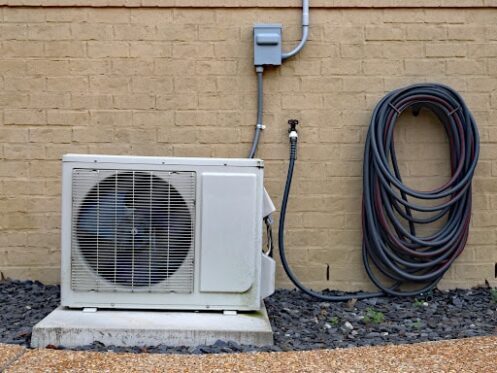
For decades, homeowners in Columbus, OH only had one viable option to cool their homes efficiently. Their only choice was to install a central air conditioning system. Such systems cool an entire home using far less electricity than relying on multiple window units. However, most central air conditioning systems operate as a single large zone. That means you have to cool parts of your home you may not be using and can only set a single temperature for your entire home. Today, mini-split AC systems offer homeowners a best-of-both-worlds cooling option. Unfortunately, the average homeowner may not have the knowledge required to choose between these two options. Let’s fix that! Here is a guide on choosing between a central air conditioning system and a mini split for your Columbus home.
The Pros of Central Air Conditioning
If you live in a home built after the 1950s, there is a good chance it has a central HVAC system and the in-wall ductwork needed to support it. With that infrastructure in place, choosing a new central air conditioner to replace your existing one is your most straightforward option. It means you can install a new system with minimum hassle and few modifications to your home.
Newer central air conditioning systems are significantly more energy efficient than older ones. That is due to advances in air conditioning technology and increases in the mandatory minimum efficiency standards set by the U.S. Department of Energy. So, if your existing air conditioner is 20 years old, any new system you purchase will probably save you money on operating costs. In some cases, a new AC system could be 30% to 45% more efficient than the 20-year-old system it replaces.
Central air conditioning systems are also simple to maintain and quite familiar to HVAC contractors. That means keeping your new system in good operating condition throughout its lifetime is easy and relatively inexpensive. You also won’t need to conduct an extensive search for an HVAC technician with ample experience working with central AC units.
The Cons of Central Air Conditioning
Of course, there are downsides associated with central air conditioning systems. The first con is that they don’t offer much control over temperatures throughout your home. Since they rely on a centralized thermostat, there is always a chance that your home will have warm and cold spots, depending on how far from the thermostat you move. In larger homes, you may also experience airflow issues in the rooms furthest from the system’s indoor blower unit.
If you have a central air conditioner, you’ll need to maintain your ductwork. Over time, ducts can develop leaks that rob your central AC of efficiency and may affect your comfort. Air ducts also need cleaning periodically so they don’t circulate dust, dirt, and allergens around your home, reducing indoor air quality.
The Pros of Mini Splits
If you are unfamiliar with them, mini-split air conditioning systems are a cross between a window air conditioner and a central air conditioner. With a mini split, you cool your home with a single outdoor condenser unit and individual air handlers installed in each room you wish to cool. This configuration comes with some major benefits.
First, a mini split doesn’t require ductwork. That means there is no energy loss from leaky ducts. There are also no air quality issues resulting from dirty ductwork.
Mini splits are also typically cheaper to operate than conventional central air conditioning systems. This is because, in addition to doing away with ductwork-related energy losses, many mini-split systems also use inverter technology and variable-speed blower motors. These modifications allow a mini split to use only as much energy as needed to cool the space.
On top of that, mini splits allow you to set a different temperature for each indoor air handler. You can fine-tune the temperature in your home or turn off the air handlers in unused rooms completely. Doing this improves your comfort inside your home and saves money on operating costs.
The Cons of Mini Splits
As you can see, there are good reasons why mini splits are gaining traction among homeowners here in Columbus. There are some downsides to them, though. For example, the upfront cost tends to be more than comparable central air conditioning systems, not including ductwork. In addition, your installation costs may be higher if you are substituting a mini split for an existing central air conditioner.
Some homeowners don’t like the look of having an individual air handler in every room. A conventional mini-split air handler is approximately 12 inches by 32 inches by 9 inches, so they are far from invisible. Although recessed ceiling cassette air handlers are an option for those that prefer them, they add significantly to the costs of a mini-split system.
You will also need to clean the air filters in each air handler periodically. Instead of a single replaceable filter as you would have in a central air conditioner, mini splits tend to use a washable filter in each air handler. If you have a big home, keeping your filters clean can be quite a chore to stay on top of.
Making the Right Choice
For most homeowners, deciding between a central air conditioner and a mini split comes down to a few simple considerations. The first one is cost. If you already have a central air conditioner, replacing it with a similar system is probably your cheapest option. If your home doesn’t have ductwork or an existing central air conditioning system, the opposite is true. Installing ductwork inside finished walls is costly and disruptive. In that case, a mini split is a superior option.
The next consideration is how important flexibility is to you. If you want a single-zone system that works to keep your entire house at one temperature, a central air conditioner is perfect. If you want more precise control over the temperature conditions in your home, a mini split is a better choice.
The final thing to consider is operating costs. In the long run, a mini split will likely cost less than a central air conditioner to operate. Depending on how you use your system, the savings could be dramatic. Plus, it is common to find mini-splits with SEER ratings far above the average central air conditioning system.
Consult Your Helpful AC Experts
If you are still having trouble deciding between a central air conditioner and a mini-split system, don’t fret! The experts here at Apex Plumbing, Heating, and Air Pros can help. We are accredited by the Better Business Bureau and offer comprehensive HVAC and plumbing services throughout greater Columbus. When you need an expert opinion on which air conditioning system is best for your home, turn to us and discover why our customers call us “The Pros Who Knows.” Contact Apex Plumbing, Heating, and Air Pros for all your HVAC needs today!





